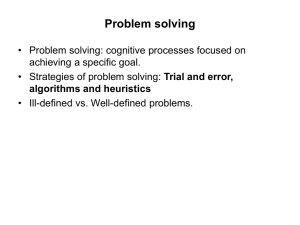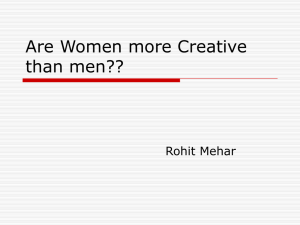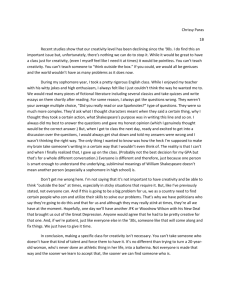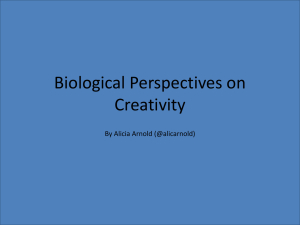Intelligence and Creativity - Psychology
advertisement
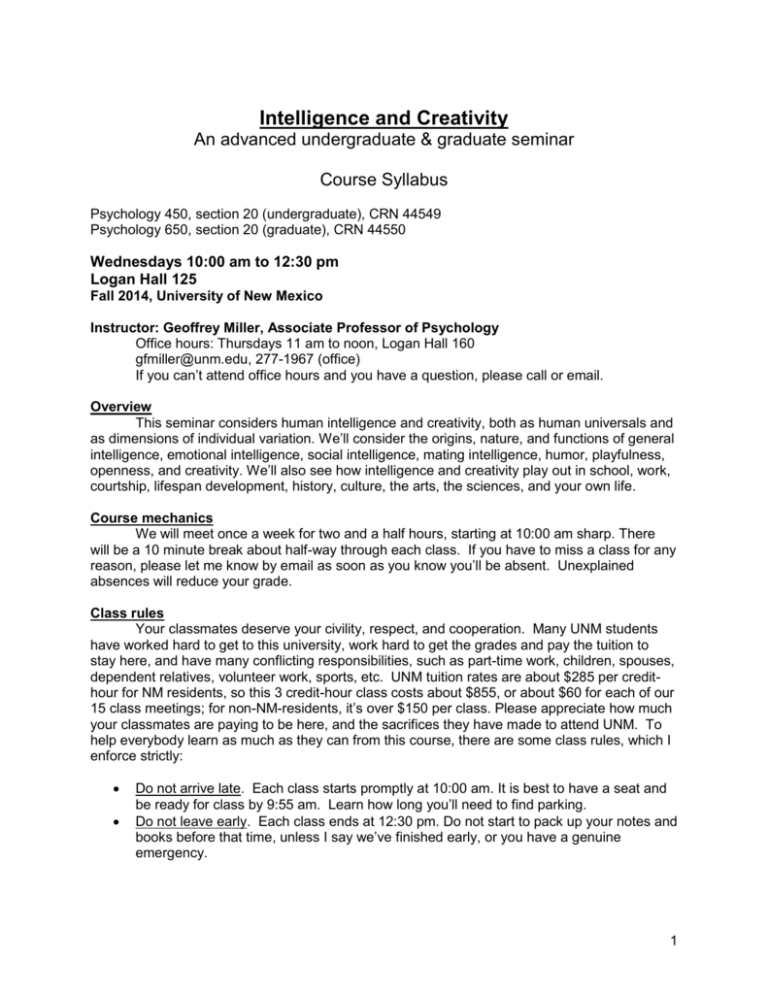
Intelligence and Creativity An advanced undergraduate & graduate seminar Course Syllabus Psychology 450, section 20 (undergraduate), CRN 44549 Psychology 650, section 20 (graduate), CRN 44550 Wednesdays 10:00 am to 12:30 pm Logan Hall 125 Fall 2014, University of New Mexico Instructor: Geoffrey Miller, Associate Professor of Psychology Office hours: Thursdays 11 am to noon, Logan Hall 160 gfmiller@unm.edu, 277-1967 (office) If you can’t attend office hours and you have a question, please call or email. Overview This seminar considers human intelligence and creativity, both as human universals and as dimensions of individual variation. We’ll consider the origins, nature, and functions of general intelligence, emotional intelligence, social intelligence, mating intelligence, humor, playfulness, openness, and creativity. We’ll also see how intelligence and creativity play out in school, work, courtship, lifespan development, history, culture, the arts, the sciences, and your own life. Course mechanics We will meet once a week for two and a half hours, starting at 10:00 am sharp. There will be a 10 minute break about half-way through each class. If you have to miss a class for any reason, please let me know by email as soon as you know you’ll be absent. Unexplained absences will reduce your grade. Class rules Your classmates deserve your civility, respect, and cooperation. Many UNM students have worked hard to get to this university, work hard to get the grades and pay the tuition to stay here, and have many conflicting responsibilities, such as part-time work, children, spouses, dependent relatives, volunteer work, sports, etc. UNM tuition rates are about $285 per credithour for NM residents, so this 3 credit-hour class costs about $855, or about $60 for each of our 15 class meetings; for non-NM-residents, it’s over $150 per class. Please appreciate how much your classmates are paying to be here, and the sacrifices they have made to attend UNM. To help everybody learn as much as they can from this course, there are some class rules, which I enforce strictly: Do not arrive late. Each class starts promptly at 10:00 am. It is best to have a seat and be ready for class by 9:55 am. Learn how long you’ll need to find parking. Do not leave early. Each class ends at 12:30 pm. Do not start to pack up your notes and books before that time, unless I say we’ve finished early, or you have a genuine emergency. 1 Do not come to class if you are too tired, ill, hung over, etc. to pay attention and participate properly; do not come if you have a cold or flu and are likely to be infectious. I will excuse absences for illness with a doctor’s note. Get your rest and stay healthy. Turn off your mobile phones and other electronics in class (except during the breaks). Do not use them to call, text, facebook, or web-surf. If you have special circumstances, like you must remain available for a child or other dependant, set your phone to vibrate and go outside the classroom to take any urgent call. Use physical copies of the textbooks, not ebooks. Eat a decent breakfast before class. Hungry students can’t pay attention. Your brain needs a good, steady supply of protein, fat, and complex carbohydrates to work properly. Do not chew gum or eat in class. Chewing gum would interfere with your ability to talk clearly during discussions. Nobody wants to see or smell your food. It’s OK to bring drinks (coffee, water bottles). If you have a disability, I will try to accommodate your needs. Please send an email explaining your situation. The UNM Accessibility Office is good at organizing assistive technology, reading and note-taking services, and so forth. During discussions, be thoughtful, respectful, and constructive. Be polite, open-minded, and inclusive. Discuss issues based on theories and evidence, not personal anecdotes and opinions. Required textbooks: Ian J. Deary (2001). Intelligence: A very short introduction. Paperback $9 used. R. Keith Sawyer (2011). Explaining creativity: The science of human innovation (2nd Ed.). Paperback new $64. Glenn Geher & Geoffrey F. Miller (Eds.). (2007). Mating intelligence: Sex, relationships, and the mind’s reproductive system. Paperback $60 new. You must buy hardcopies of these books so you can highlight, underline, and make comments in the margins as you read. You should also bring the relevant book to class so you can contribute to discussions by referring to your notes. You’ll need the Deary Intelligence book first; the others you might find cheaper, used, on amazon.com. Reading requirements Each week we will read and discuss material from the textbooks. Please do not take this course if you cannot commit an average of three hours a week to the readings. The educational benefits of the course depend on you doing the readings on time, so you can contribute to class discussions. If you don’t read the assignments, you won’t learn much; if you do read them attentively, you’ll learn a lot. Some of the readings are harder than others; some weeks require more reading than other weeks. I expect all of each week’s required readings to be completed well before class, so you have time to digest them, think about them, compare and contrast them, and prepare intelligent comments and questions about them. Last-minute reading will not yield good comprehension or good in-class discussion. If you see a word, term, or concept that you don’t understand when reading, don’t just gloss over it and hope for the best; instead, look it up through Google search or Wikipedia. In the course schedule on the last few pages of this syllabus, I’ve included page-counts of actual text to read (not including bibliographies etc.) for each assignment. The book chapters will probably take you about 2-3 minutes per page. Plan your study time accordingly. 2 Grading You can get a very good grade in this course if you keep up with the readings, think about them, attend class regularly, and participate as best you can. Your grade will depend on two kinds of work for this course 50%: class attendance, participation, and discussion points (see below) 50% of grade: one term paper, due in two stages (see below) (no tests or exams) Class attendance, participation, and discussion points: 50% of final grade Most of our class time will be spent discussing the readings. Sometimes I’ll give little mini-lectures for a few minutes on particular ideas or findings that might need explaining from the readings. But for most of each class, I’ll be moderating discussions and debates among you, the students. So, I expect regular attendance, knowledge of assigned readings, active participation and intellectual engagement, and thoughtful questions and commentaries about the readings. I will keep records of who attends each class, who asks good questions and makes insightful comments, who seems to have done the readings conscientiously, and who contributes to making this class an intellectually vibrant and rewarding experience for the other students. Before each class, you should write down one good discussion point about each assigned reading. If there are three assigned readings (such as three book chapters) for a class, for example, you should have three discussion points ready to go – one for each chapter. Each discussion point could be a thoughtful comment, question, critique, or comparison to other readings, theories, or findings. It should not just summarize the reading’s argument, but it should show that you have understood the reading, and developed your own thoughts in response. It should not just be a personal reaction or anecdote vaguely related to the reading, but it could relate the reading’s ideas to current events, controversies, or real-life issue. The best discussion points are both funny and intellectually serious. If you haven’t understood the reading well enough to prepare a discussion point, you should be ready to say what specific theories, concepts, or findings you found most confusing, and why. If you didn’t understand something after reading it carefully, other students probably didn’t either, and we should discuss and clarify it. You should write out these discussion points before each class, expressed clearly and concisely enough that you can read them our loud quickly, and written down clearly so you can read them. I won’t collect these discussion points, but I will call on students to read them aloud to the class. If I call on you and you haven’t done that particular reading or prepared a thoughtful comment, your participation grade will be lower for that class. If I call on you and you have a great comment that sparks a lot of discussion, your participation grade will be higher. If you’re shy, knowing that you have good discussion points written down ahead of time will make it easier for you to speak up without feeling awkward. The best discussion points do not just show off how clever you are, but are effective at getting other students engaged in the intellectual life of our class. You’ll learn as the term progresses what kind of comments are good discussion-sparks and which fall flat. Term paper in two stages: 50% of final grade The term paper determines 50% of your course grade, and will be developed in two stages that will be graded separately. You can choose any topic related to the course content and course readings. The final paper should be about 3,000 words, plus references. I care more about clarity, insight, research, and the flow of argument than about length per se. 3 The final term paper must be in standard APA (American Psychological Association) research paper format. If you’re not familiar with APA style, skim the APA Publication Manual for details, or see one of the online sites that summarizes its key points, such as https://owl.english.purdue.edu/owl/resource/560/01/ Both stages should be printed single-sided on standard size white paper, with 1 inch margins, double-spaced, in 12 point Arial or Times Roman font. For graduate students, my goal is for you to produce a paper that could serve as a useful part of your master’s thesis, comprehensive examination, or dissertation – or that you could submit to a decent journal as a review or commentary piece. To make sure that you are thinking, researching, and writing the paper on a good schedule throughout the semester, you’ll submit the three assignments about one month apart. I’ve used this system in many previous classes, and it really helps students pace their work and avoid any last-minute panic about their papers. Stage 1: Oct. 8 in class: Provisional title, abstract, outline, and annotated bibliography due (20% of final course grade). Turn in a hardcopy document in class that day, including: 1) A provisional title, ideally about 8-20 words, that concisely explains what you think you’ll write about for the rest of the term. The title should be clear, concise, detailed, and take a stand on some issue in emotions research. A bad example title would be “Disgust and politics” – it’s too vague. A better example title would be “Sexual disgust explains conservative attitudes towards abortion and gay marriage.” If you change your mind about your topic later, no problem, just tell me in an email later. Pick a topic that you feel passionate about – you’ll have to live with it for several months! (Of course, also include your name under the title). 2) A one-paragraph abstract, just under your title, in APA format, ideally about 150-250 words. Your title alone should give me a clear idea what you expect to write about. This abstract should go into more detail, demonstrating that you’ve already been doing some background reading about your issue, and you’re already starting to develop some of your own ideas. It should give me a sense of how you’ll structure your final term paper, how your flow of argument will go, and what kind of examples and findings you’ll use to support your points. The best abstracts have no wasted words or fluff: they get straight to the point and have real detail. 3) A provisional outline, around 2 pages long, that shows the planned structure of your paper. It should clearly show your flow of argument, and the specific theories, findings, and issues that you’ll consider. The outline should include about 4 to 7 section headings that describe the overall organization of your term paper. A bad section heading would be a vague place-holder, such as “Introduction” or “Conclusion”. A good section heading would be much meatier, e.g. “Introduction: Three contrasting theories of sexual disgust”. Under each section heading, you should have outline entries that show how you’ll flesh out your arguments. A bad entry would be “Schizotypy and creativity.” A good entry would be “Schizotypy predicts creative achievement better than bipolar symptoms do”. Outline entries can also cite bibliography entries as above. 4) A provisional bibliography, after the abstract, listing about 10 to 20 sources relevant to your topic that you have actually read. Most of them should be journal papers; a few could be books (if you really had time to read them); they should not just be online resources, blogs, popular science features, etc. They should not all be from the syllabus here – you should use UNM’s online library resources and Google Scholar to find additional journal papers. In citing them, use standard APA reference format, e.g. as explained here: http://www.library.cornell.edu/resrch/citmanage/apa . Also, you should explain each reference’s relevance to your topic with a brief annotation right after the APA citation. A good annotation would be “This paper critically reviews 18 recent 4 studies of domain-specific disgust effects, emphasizing the similarities between social disgust and cheater-detection, and between pathogen-avoidance disgust and nausea.” A bad annotation would be “Reviews disgust research”. After I get this initial packet from you, I will write comments and suggestions on it and return it as soon as I can. You should take this feedback seriously in preparing your final term paper. Stage 2: Dec. 5 (Friday by 3 pm): Final term paper due (30% of course grade): turn in to Geoffrey Miller’s mailbox in Psychology Front Office, Logan Hall. This should be the culmination of three months of research, thinking, and writing about some aspect of intelligence or creativity that passionately interests you. It should take seriously my feedback on first stage assignment. It must be in standard APA (American Psychological Association) research paper format; see the APA Publication Manual for details. This means double-spaced, single-sided, in 12 point Arial font, with a proper title page, abstract, references, and page numbering. It should be a highly polished document, thoroughly proofread, with no spelling or grammatical errors. The final term paper should include the following: Title: a clear, descriptive, engaging title, about 8-20 words, and your name Abstract: a concise, punchy abstract that interests the reader in your paper, about 150250 words Introduction: Start with a bang. Pose the problem that interests you, and how you’ll approach it. Say where you stand, and why the reader should care. Be specific and clear; mix the theoretical and methodological level of discourse with real-life examples and issues; know when to be funny and when to be serious. Body of the paper: depending on what you’re writing about, this could include a literature review, a series of arguments, an overview of relevant ideas and research from a related area or field, a series of methodological analyses, criticism, and suggestions, or anything that advances your points. If you include literature reviews, don’t do generic overviews – review the literature with a purpose, critically, as it pertains to your topic. Research proposal: towards the end of your paper, sketch out a new empirical study that could resolve one of the issues you’ve raised in your paper. This could be a brief outline of a proposed experiment, an observational study, analysis of an archival dataset, or any other approach you think would be appropriate. You should explain what data would be collected, how it would be analyzed (roughly), and how the results would give insight into one of your paper’s key outstanding questions. Annotated Bibliography: This should include about 20 to 30 good, relevant references that you’ve actually read; only some of them should be from this class syllabus. If your bibliography includes good, relevant papers and books that I haven’t read before, I will be impressed. Grading differences for Psych 650 (graduates) vs. Psych 450 (undergraduates) Students taking this course for Psych 650 credit (as graduate students) will be expected to show higher levels of scientific expertise, intellectual sophistication, background research, and writing skill throughout their in-class comments and term paper assignments. In particular, I expect graduate students to (1) read the assigned papers and book chapters more attentively, closely, and critically, (2) make more thoughtful, integrative, and comparative comments on the readings, (3) show higher intellectual maturity, complexity, and flexibility in their responses to scientific controversies, and (4) produce final term papers that could be submitted, with a little polishing, to a decent scientific journal. 5 Provisional Course Schedule *************************************** No assignments before the first class 1: Aug. 20 Introduction to the course *************************************** Before the second class: In Intelligence by Ian Deary, read: Preface, pp. viii-x (3 pp) A word about correlation, pp. xi-xvi (6 pp) Chapter 1: How many types of intelligence are there?, pp. 1-16 (stop on p. 16 at ‘To follow this area up’) (16 pp) Chapter 5: Does intelligence matter?, pp. 91-99 (9 pp) (34 pp total) 2: Aug. 27 Introduction to intelligence, the g factor, and what IQ predicts *************************************** In Intelligence by Ian Deary, read: Chapter 2: What happens to mental abilities as we grow older?, pp. 19-40 (22 pp) Chapter 6: Is intelligence increasing generation after generation?, pp. 102-112 (11 pp) (33 pp total) 3: Sept. 3 Stability of intelligence across life, and across generations *************************************** In Intelligence by Ian Deary, read: Selections from Chapter 3: Why are some people cleverer than others?. Read only: o pp. 43-49 (stop before ‘The brain’s electrical activity’) (6 pp) o pp. 59-65 (from ‘Reaction time’ to end of chapter) (7 pp) Chapter 4: Are intelligence differences a result of genes or environments or both?, pp. 67-88 (stop on p. 88 ‘To follow this area up’) (22 pp) (35 pp total) 4: Sept. 10 Neuroscience and genetics of intelligence *************************************** In Mating Intelligence edited by Geher & Miller, read: Chapter 1: Mating intelligence: Toward an evolutionarily informed construct, pp. 3-28 (25 pp) Chapter 5: Personality, mating strategies, and mating intelligence, pp. 121-132 (12 pp) (37 pp total) 5: Sept. 17 Mating intelligence, mating strategies, and personality traits *************************************** In Mating Intelligence edited by Geher & Miller, read: 6 6: Sept. 24 Chapter 9: Mental disorders as catastrophic failures of mating intelligence, pp.193-218 (25 pp) Chapter 11: Emotional intelligence, relationship quality, and partner selection, pp. 263-278 (15 pp) (40 pp total) Mental fitness indicators, schizotypy, emotional intelligence, mate choice *************************************** In Mating Intelligence edited by Geher & Miller, read: Chapter 10: The role of creativity and humor in mate selection, pp. 227254 (27 pp) Chapter 15: Mating intelligence: Frequently asked questions, pp. 367-386 (20 pp) (47 pp total) 7: Oct. 1 Creativity and humor in courtship *************************************** In Explaining Creativity by Keith Sawyer, read: Chapter 1: Introduction, pp. 3-14 (12 pp) Chapter 2: Conceptions of creativity, pp. 15-34 (20 pp) (32 pp total) Term paper stage 1 due 8: Oct. 8 Introduction to mainstream creativity research *************************************** In Explaining Creativity by Keith Sawyer, read: Chapter 3: Defining creativity through assessment, pp. 37-63 (26 pp) Chapter 4: The creative personality, pp. 63-84 (22 pp) (48 pp total) 9: Oct. 15 Individual differences in creativity *************************************** In Explaining Creativity by Keith Sawyer, read: Chapter 5: The creative process, part 1, pp. 87-105 (18 pp) Chapter 6: The creative process, part 2, pp. 107-126 (20 pp) Chapter 7: The creative process, part 3, pp. 129-142 (13 pp) (51 pp total) 10: Oct. 22 The creative mind: Finding problems, generating ideas, judging solutions *************************************** In Explaining Creativity by Keith Sawyer, read: Chapter 9: Biology and creativity, pp. 157-183 (27 pp) Chapter 11: The sociology of creativity, pp. 211-229 (19 pp) (46 pp total) 11: Oct 29 Biological vs. sociological approaches to creativity *************************************** In Explaining Creativity by Keith Sawyer, read: Chapter 14: Culture and creativity, pp. 265-280 (16 pp) 7 12: Nov. 5 Chapter 15: History and creativity, pp. 281-294 (14 pp) (30 pp total) Cultural, economic, historical, and developmental influences on creativity *************************************** In Explaining Creativity by Keith Sawyer, read: Chapter 16: Visual arts, pp. 297-319 (23 pp) Chapter 18: Music, pp. 337-356 (20 pp) (43 pp total) 13: Nov. 12 Creative processes in art and music *************************************** In Explaining Creativity by Keith Sawyer, read: Chapter 17: Writing, pp. 319-334 (16 pp) Chapter 19: Theater, pp. 357-369 (13 pp) Chapter 20: Science, pp. 371-386 (16 pp) (45 pp total) 14: Nov. 19 Creative narratives: Writing, performance, and science *************************************** [Nov. 26: day before Thanksgiving: No class, so you can make travel arrangements more easily] *************************************** In Explaining Creativity by Keith Sawyer, read: Chapter 22: How to be more creative, pp. 405-425 (21 pp) Chapter 23: Conclusion, pp. 427-433 (7 pp) (28 pp total) 15: Dec. 3 Creativity training, creativity advice, and the future of creativity research (last day of class) *************************************** Dec. 5 Friday by 3 pm: Term paper stage 2 (final paper) due due in my mailbox, Logan Hall main office *************************************** (Final exams Dec. 8-12 no exam in this class) 8

